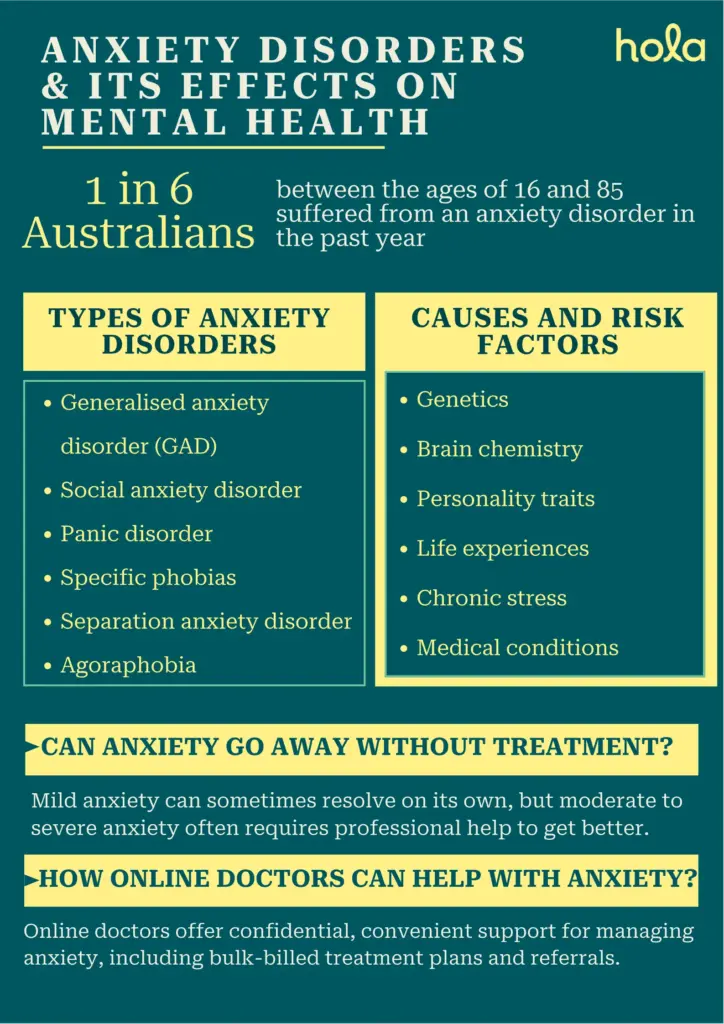Types of anxiety disorders & its effects on mental health
Written by editorial staff writer at Hola. Medically reviewed by Amira Shah, MA in Counselling Psychology, Registered Psychotherapist.

Contents

Summary: Anxiety disorders manifest in various forms, including generalised anxiety disorder, social anxiety, panic disorder, specific phobias, agoraphobia, separation anxiety, and selective mutism. While each condition is unique, they often involve a common thread: overwhelming fear or worry that interferes with daily life. These disorders impact mental health by causing emotional fatigue, reduced self-confidence, sleep disturbances, and social withdrawal. However, anxiety is treatable. With the right combination of support—like counselling, medication, or lifestyle changes—many people learn to manage their anxiety and feel better overall.
Have you ever felt like your brain just won’t hit the “off” switch on worry? You’re not alone—and it’s a real experience shared by many. Statistics show that one in six Australians (17.2%) between 16 and 85 have lived with an anxiety disorder1 in the past year. It’s a clear sign that anxiety is a common mental health challenge. But here’s the bright side: understanding what you are facing is the first step toward feeling better. So, let’s break it down—what types of anxiety exist, how do they impact our mental health, and how can we take back control? Let’s explore it together.


What are anxiety disorders?
Anxiety disorders are a category of mental health issues where individuals experience overwhelming, ongoing fear or concern that disrupts their everyday life. While it is common to feel anxious at times, such as before an exam or a job interview, individuals with anxiety disorders endure significant and persistent anxiety that is frequently disproportionate to the circumstances. There are various forms of anxiety disorders, such as generalised anxiety disorder (GAD), social anxiety, panic disorder, specific phobias, and separation anxiety. Symptoms may include feelings of restlessness, a racing heartbeat, difficulty concentrating, sleep disturbances, and the tendency to avoid certain situations.Different types of anxiety disorders
Anxiety disorders comprise a collection of mental health issues characterised by excessive fear, worry, or anxiousness. The most prevalent types include:- Generalised anxiety disorder (GAD): Defined by ongoing and disproportionate worry about everyday matters, often without any identifiable reason. Individuals with GAD may experience restlessness, fatigue, or difficulty concentrating.
- Social anxiety disorder: Involves a significant fear of being evaluated or humiliated in social or performance situations. This may lead to the avoidance of social gatherings or encounters.
- Panic disorder: Characterised by abrupt and recurrent panic attacks, marked by sudden feelings of intense fear, heart palpitations, sweating, and shortness of breath occurring unexpectedly.
- Specific phobias: Entails an extreme fear of a particular object or scenario (such as spiders, flying, or heights) that is disproportionate about the actual risk.
- Separation anxiety disorder: More prevalent in children but can also affect adults. It involves an intense fear of being separated from loved ones or home.
- Agoraphobia: A fear of environments or situations where escape may be challenging, such as dense crowds, public transportation, or open areas. This can lead to avoidance and seclusion.
Take control of your mental health. Begin your care plan now.
Book an appointment
Fully bulk-billed, across Australia.
Causes and risk factors of anxiety disorders
Anxiety disorders can develop due to a combination of genetic, psychological, environmental, and lifestyle influences. Although the specific origins are not always clear, several significant factors are known to heighten the risk:- Genetics: A family background of anxiety or other mental health issues may increase a person's vulnerability.
- Brain chemistry: Imbalances in neurotransmitters such as serotonin and dopamine can impact how the brain reacts to stress.
- Personality traits: Individuals who are inherently shy, perfectionistic, or inclined towards negative thinking may have a higher likelihood of experiencing anxiety.
- Life experiences: Trauma, abuse, neglect, or significant life transitions (such as divorce or job loss) can trigger anxiety, particularly if encountered early in life.
- Chronic stress: Continuous pressure from work, financial difficulties, or relationship troubles can accumulate over time and contribute to anxiety.
- Medical conditions: Health problems like thyroid disorders, heart issues, or chronic pain can mimic or exacerbate anxiety symptoms.
Diagnosis and treatment options for anxiety disorders
The process of diagnosing an anxiety disorder typically begins with an telehealth appointment with a General Practitioner (GP) or mental health expert. They will inquire about your symptoms, medical history, lifestyle, and the impact of anxiety on your daily activities. In some cases, questionnaires or assessments may be utilised to gain a clearer understanding of the type and severity of anxiety. The doctor will also rule out physical conditions (such as thyroid disorders) that may resemble anxiety.Treatment choices:
Managing anxiety disorders is tailored to individuals and may include one or more of the following methods:- Psychological therapy: This is often the most common and effective form of treatment. Techniques like Cognitive Behavioural Therapy (CBT) assist in recognising and managing anxious thoughts and behaviours.
- Lifestyle modifications: Enhancing sleep, nutrition, exercise, and mitigating stress can considerably alleviate anxiety symptoms.
- Mindfulness and relaxation methods: Breathing techniques, meditation, and yoga can help address the physical manifestations of anxiety.
- Support groups or counselling: Engaging with a professional or individuals with similar experiences may provide comfort and help diminish feelings of isolation.
When should you get help for anxiety?
You should consider seeking assistance for anxiety if it begins to impact your day-to-day life, relationships, work, or sleep. Feeling worried occasionally is normal, but if you find yourself anxious most days, unable to control your worry, or experiencing symptoms like a racing heart, restlessness, or panic attacks, it’s important to talk to a professional. Avoiding certain situations, having difficulty concentrating, or feeling mentally drained are also indicators that you may benefit from support. A general practitioner or mental health professional can evaluate your symptoms and guide you toward effective treatment options, which may include therapy, lifestyle adjustments, or a Mental Health Treatment Plan (MHTP). Getting help early can stop anxiety from worsening and assist you in regaining balance and confidence in your daily activities.How online doctors can help with anxiety
Online doctors provide convenient, confidential assistance for managing anxiety without requiring an in-person visit to a clinic. Through secure consultations via video or phone, they can evaluate your symptoms, eliminate other medical issues, and offer personalised advice. If necessary, they can develop a Mental Health Treatment Plan, often bulk billed, which allows access to Medicare-subsidised sessions with psychologists in Australia. They may also refer you to other mental health professionals or recommend evidence-based coping strategies. Telehealth simplifies the process of seeking help if you're feeling overwhelmed, reside in a remote area, or prefer the convenience of receiving care at home. Services like Hola Health connect you with qualified doctors promptly, ensuring you receive timely assistance to effectively manage anxiety.Getting a mental health care plan online
In Australia, obtaining a Mental Health Care Plan (MHCP) online is straightforward through a telehealth consultation with a GP. This plan is intended for those facing mental health difficulties such as anxiety, depression, or stress and provides access to subsidised sessions with a psychologist or therapist through Medicare. Here’s the process:- Schedule an online appointment with a qualified GP through a telehealth platform (e.g., Hola Health).
- During the consultation, the doctor will evaluate your mental health and discuss your concerns.
- If suitable, they’ll develop a Mental Health Care Plan customised to your requirements.
- You’ll then be directed to an appropriate mental health professional, with eligibility for up to 10 subsidised sessions each calendar year.
Conclusion:
Anxiety might feel overwhelming, but it doesn’t have to run your life. With the right support and tools, you can ease the stress and move toward a more peaceful mindset.FAQs
What are the most common types of anxiety disorders?
Here are the most common types of anxiety disorders:- Generalised Anxiety Disorder (GAD)
- Panic Disorder
- Specific Phobias
- Social Anxiety Disorder
- Agoraphobia
- Separation Anxiety Disorder
How do I know which type of anxiety I have?
To identify the type of anxiety you may be experiencing, notice your main triggers. Constant worrying might mean generalised anxiety disorder (GAD), panic attacks may signal a panic disorder, fear of being judged might suggest social anxiety, specific fears may relate to phobias, and fear of open or crowded spaces may point to agoraphobia. The best way to know is to talk to a mental health professional for a proper assessment and guidance.How common are anxiety disorders?
Anxiety disorders are extremely prevalent and among the most widespread mental health conditions globally. According to the World Health Organisation (WHO), they affect about 4% of the global population. In Australia and many other countries, anxiety is reported even more frequently than depression. It can affect individuals of any age or background, but the good news is that anxiety disorders are highly treatable with the right support and care.Can anxiety go away without treatment?
Mild anxiety can sometimes resolve on its own, especially if it’s short-term. But moderate to severe anxiety often requires professional help to get better.What’s the difference between stress and anxiety disorder?
Stress and anxiety disorder may feel similar, but they’re different:- Stress is a natural response to a challenge, like a deadline or tough situation. It usually fades once the situation is resolved.
- An anxiety disorder is more severe, lasts longer, and often shows up without an obvious trigger. It can disrupt daily functioning and may require professional help.
Do I have anxiety, or am I just feeling anxious?
Feeling anxious is a natural response to stress or a difficult situation, like an exam, an interview, or a disagreement. It generally disappears once the moment passes. An anxiety disorder, involves worry that is severe, persistent, and often occurs without a clear reason. It can affect your daily life, work, relationships, sleep, or ability to focus. When anxious thoughts feel constant, overwhelming, or hard to control, speaking with a mental health professional can help. They can guide you through it.Take control of your mental health. Begin your care plan now.
Book an appointment
Fully bulk-billed, across Australia.
Reference
- Australian Bureau of Statistics - reference link
- World Health Organisation - reference link
What we treat
- Cough
- Nausea & vomiting
- Fever
- Hayfever
- Fatigue
- Sore throat
- Acne
- Hair loss
- Gout
- Eczema
- Rosacea
- Sunburn
- UTI
- Erectile dysfunction
- Contraception
- Morning sickness
- Morning after pill
- Prostate health
- Anxiety
- Depression
- Stress
- Grief & loss
- Antidepressants
- Premature ejaculation
- Asthma
- Blood pressure
- Blood thinners
- Diabetes
- Cholesterol
- Migraines & headaches
- Allergies
- Body ache
- Heartburn & reflux
- Sleep disorder
- Pain relief
- Gastro
Related Articles
What Is Online Therapy? Everything You Need To Know About e-Therapy
February 19, 2026Mental Health
...
Disclaimer
This blog is for general informational purposes only and does not indicate that Hola Health provides all treatments or preventive measures mentioned. It is not intended to be a substitute for professional medical advice. Always seek the guidance of your doctor or other qualified health professional with any questions you may have regarding your health or a medical condition. For emergencies please immediately contact 000. Any medical topics discussed are intended to educate, not to imply availability through Hola Health.
 Facebook
Facebook  X
X  Copy Link
Copy Link



